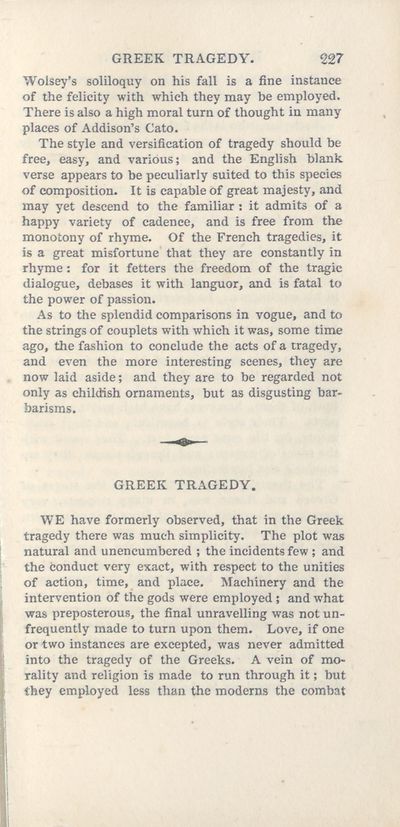Education > Essays on rhetoric
(255)
Download files
Complete book:
Individual page:
Thumbnail gallery: Grid view | List view

GREEK TRAGEDY.
227
Wolsey’s soliloquy on his fall is a fine instance
of the felicity with which they may be employed.
There is also a high moral turn of thought in many
places of Addison’s Cato.
The style and versification of tragedy should be
free, easy, and various; and the English blank
verse appears to be peculiarly suited to this species
of composition. It is capable of great majesty, and
may yet descend to the familiar : it admits of a
happy variety of cadence, and is free from the
monotony of rhyme. Of the French tragedies, it
is a great misfortune that they are constantly in
rhyme : for it fetters the freedom of the tragic
dialogue, debases it with languor, and is fatal to
the power of passion.
As to the splendid comparisons in vogue, and to
the strings of couplets with which it was, some time
ago, the fashion to conclude the acts of a tragedy,
and even the more interesting scenes, they are
now laid aside; and they are to be regarded not
only as childish ornaments, but as disgusting bar¬
barisms.
GREEK TRAGEDY.
WE have formerly observed, that in the Greek
tragedy there was much simplicity. The plot was
natural and unencumbered ; the incidents few ; and
the conduct very exact, with respect to the unities
of action, time, and place. Machinery and the
intervention of the gods were employed ; and what
was preposterous, the final unravelling was not un-
frequently made to turn upon them. Love, if one
or two instances are excepted, was never admitted
into the tragedy of the Greeks. A vein of mo¬
rality and religion is made to run through it; but
they employed less than the moderns the combat
227
Wolsey’s soliloquy on his fall is a fine instance
of the felicity with which they may be employed.
There is also a high moral turn of thought in many
places of Addison’s Cato.
The style and versification of tragedy should be
free, easy, and various; and the English blank
verse appears to be peculiarly suited to this species
of composition. It is capable of great majesty, and
may yet descend to the familiar : it admits of a
happy variety of cadence, and is free from the
monotony of rhyme. Of the French tragedies, it
is a great misfortune that they are constantly in
rhyme : for it fetters the freedom of the tragic
dialogue, debases it with languor, and is fatal to
the power of passion.
As to the splendid comparisons in vogue, and to
the strings of couplets with which it was, some time
ago, the fashion to conclude the acts of a tragedy,
and even the more interesting scenes, they are
now laid aside; and they are to be regarded not
only as childish ornaments, but as disgusting bar¬
barisms.
GREEK TRAGEDY.
WE have formerly observed, that in the Greek
tragedy there was much simplicity. The plot was
natural and unencumbered ; the incidents few ; and
the conduct very exact, with respect to the unities
of action, time, and place. Machinery and the
intervention of the gods were employed ; and what
was preposterous, the final unravelling was not un-
frequently made to turn upon them. Love, if one
or two instances are excepted, was never admitted
into the tragedy of the Greeks. A vein of mo¬
rality and religion is made to run through it; but
they employed less than the moderns the combat
Set display mode to:
![]() Universal Viewer |
Universal Viewer | ![]() Mirador |
Large image | Transcription
Mirador |
Large image | Transcription
| Antiquarian books of Scotland > Education > Essays on rhetoric > (255) |
|---|
| Permanent URL | https://digital.nls.uk/113762552 |
|---|
| Description | Thousands of printed books from the Antiquarian Books of Scotland collection which dates from 1641 to the 1980s. The collection consists of 14,800 books which were published in Scotland or have a Scottish connection, e.g. through the author, printer or owner. Subjects covered include sport, education, diseases, adventure, occupations, Jacobites, politics and religion. Among the 29 languages represented are English, Gaelic, Italian, French, Russian and Swedish. |
|---|

